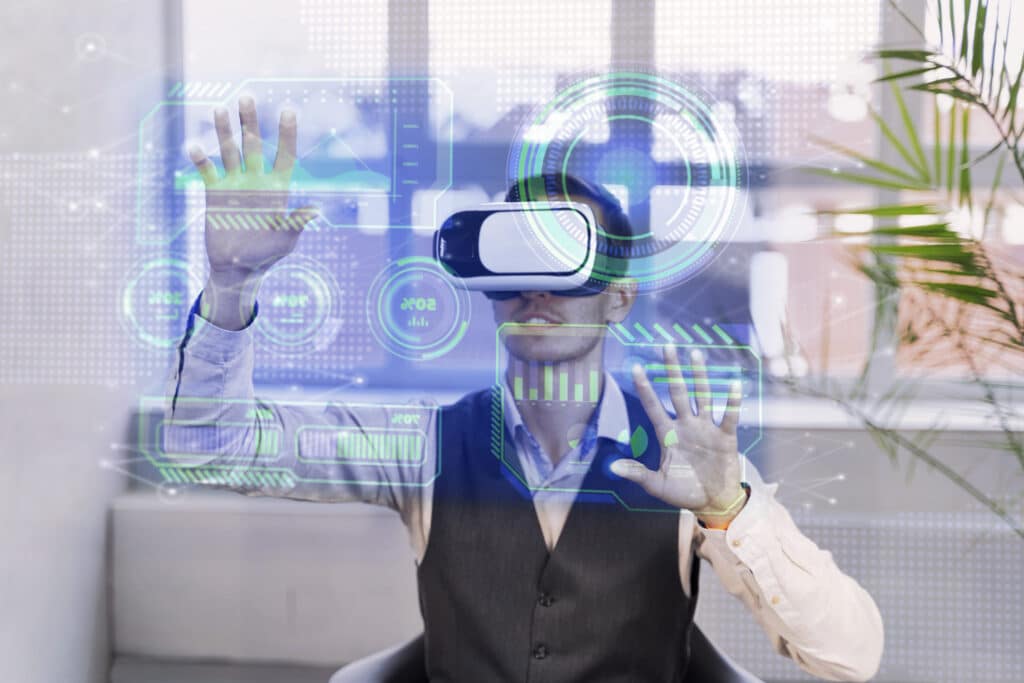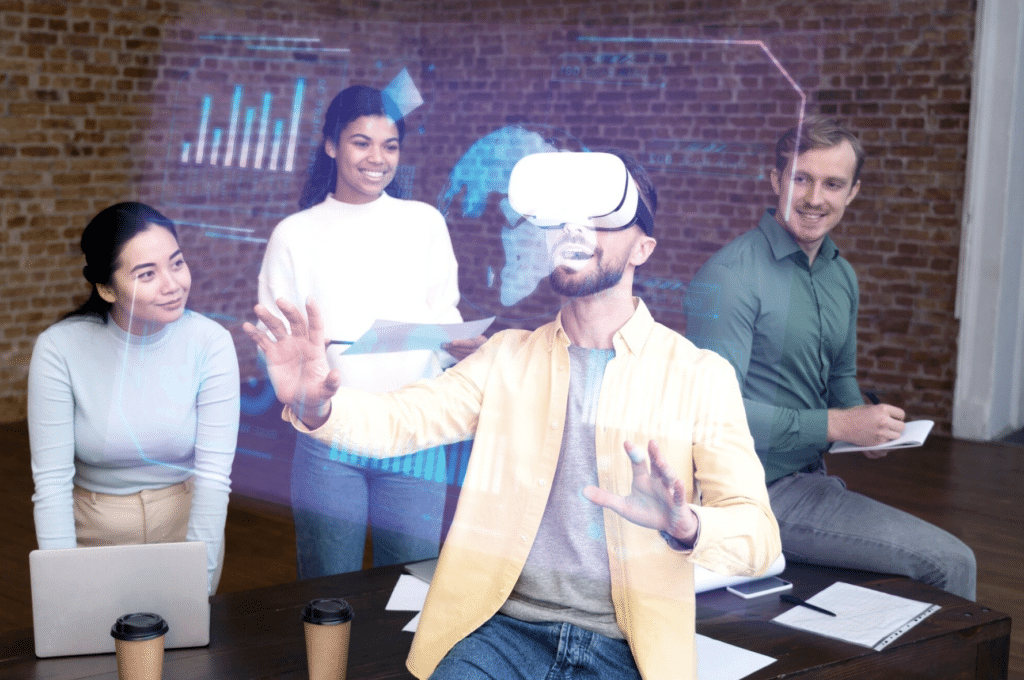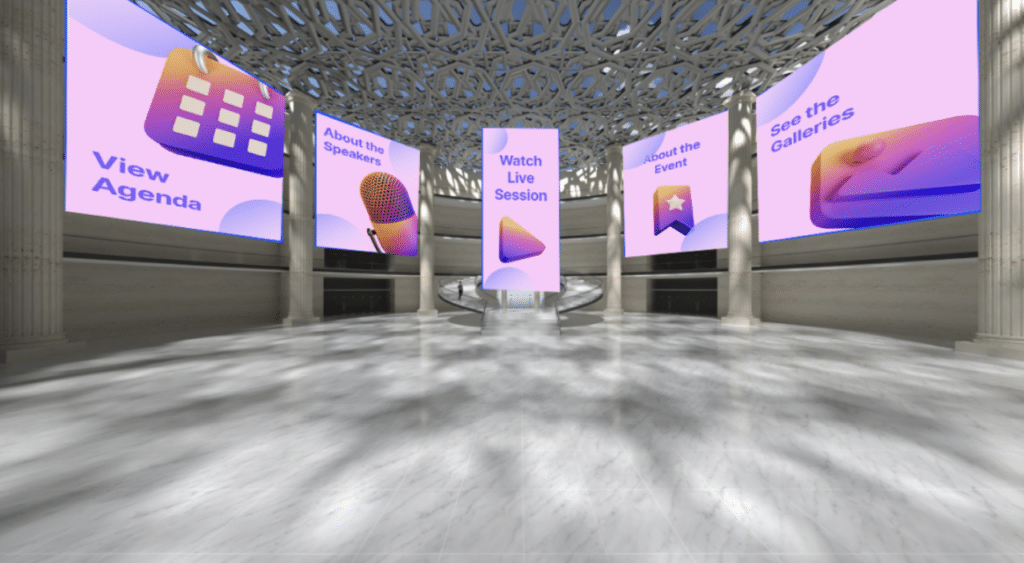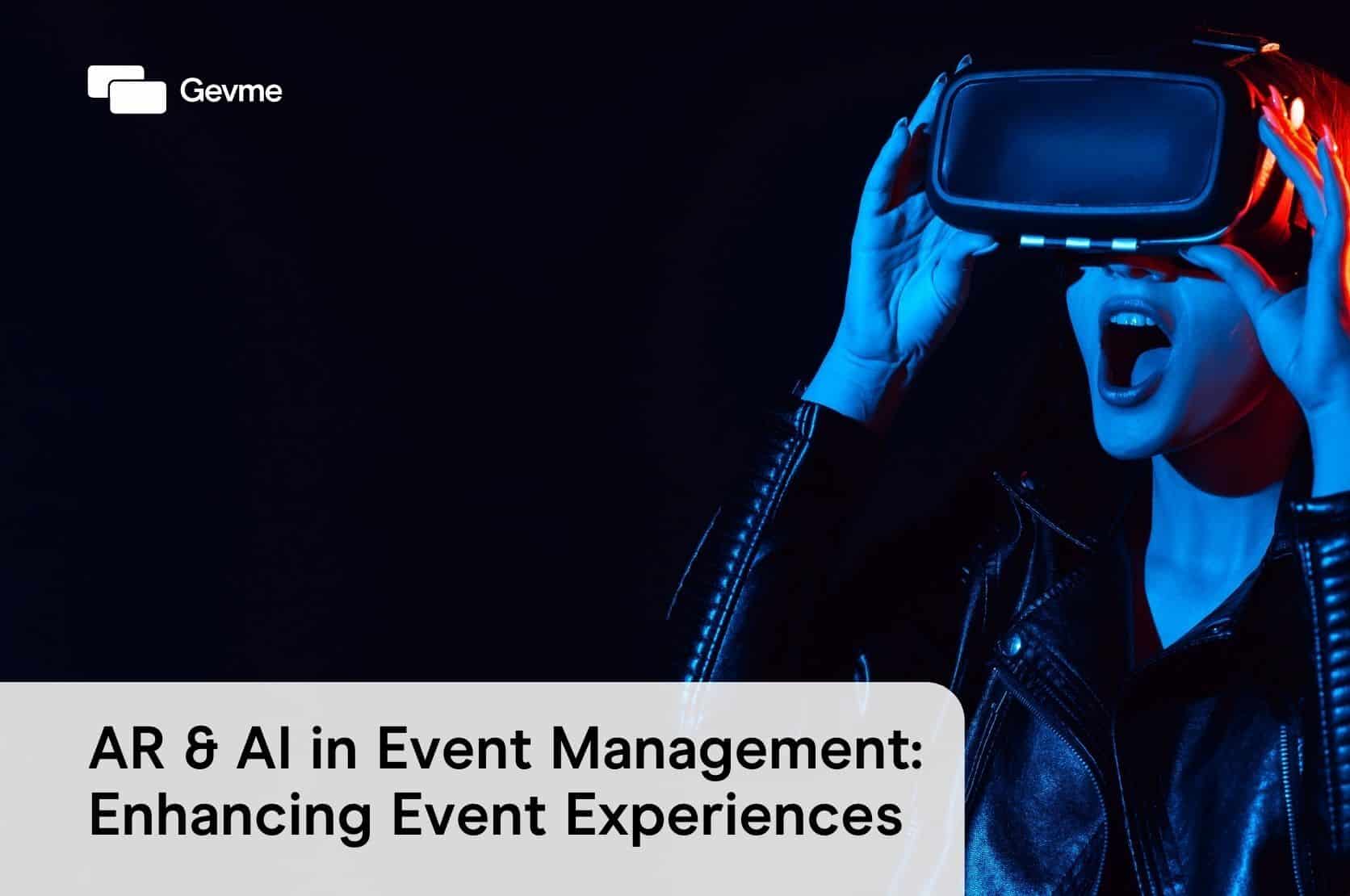In the evolving landscape of event management, the integration of Artificial Intelligence (AI) and Augmented Reality (AR) is ushering in a new era of enhanced experiences. The implementation of AI in events is not just a futuristic concept; it’s a present-day reality that is reshaping how we approach event planning and execution. These technologies are revolutionizing the industry, making event experiences more interactive, personalized, and memorable.
As we delve into the world of AI in event management, it becomes clear that the synergy between AI and AR is set to redefine the boundaries of what’s possible in creating engaging and innovative event experiences.

Understanding AI in Event Management
AI is redefining event management through its unique capabilities and applications:
- Strategic Role of AI in Event Management: AI’s role extends beyond basic analysis, delving into nuanced aspects of event planning. It evaluates long-term trends, attendee demographics, and industry shifts to inform decisions about venues, themes, and scheduling. This deep dive into data ensures that every aspect of the event is optimized for success.
- Predictive Analytics for Enhanced Event Planning: AI leverages historical data and current market trends to make precise predictions about crucial event aspects. This includes forecasting attendee behaviour, preferences, and engagement levels, allowing for a more tailored and effective planning process.
- Real-Time Adaptive Strategies with AI: During events, AI’s real-time data analysis becomes a cornerstone for adaptive management. It monitors attendee interactions, session attendance, and overall engagement, providing live insights to adjust schedules, session content, and logistics on the fly.
- Post-Event Analysis for Continuous Improvement: AI-driven post-event analysis involves deep evaluation of feedback, engagement metrics, and operational effectiveness. This comprehensive analysis helps in identifying not just areas of improvement but also successful strategies to be replicated in future events.
- AI’s Impact on Attendee Engagement: AI enhances the attendee experience by personalizing event journeys, from recommending sessions to customizing communications. It understands individual preferences and tailors the event experience to match these, enhancing satisfaction and engagement.
- AI in Risk Management: AI’s role in risk management includes scenario modeling and impact analysis. It anticipates potential challenges and disruptions, providing planners with strategies and solutions to mitigate risks effectively, ensuring a smoother event experience.
Enhancing Engagement with AR in Event Experiences
Augmented Reality (AR) in events adds a layer of interactive and immersive experiences, significantly enhancing attendee engagement:
- Interactive and Immersive Experiences: AR transforms event spaces into interactive playgrounds. It can convert static displays into dynamic, interactive experiences, allowing attendees to engage with the event environment in novel ways. For instance, AR can turn a simple exhibition booth into a fully interactive 3D product showcase, enhancing both engagement and information retention.
- Personalization Through AR: AR’s ability to personalize experiences is a game-changer. It can recognize individual attendee preferences, adjusting the AR content to suit specific interests, which could range from customizing the visual aspects of a presentation to offering personalized virtual guides.
- Enhancing Educational and Networking Opportunities: AR is particularly effective in educational and networking contexts within events. For educational sessions, AR can bring concepts to life through 3D models and interactive displays. In networking, AR can facilitate connections by providing attendees with interactive, augmented reality business cards or profiles.

- Augmented Venue Navigation: AR can assist in venue navigation, offering virtual maps and directions that enhance the attendee’s ability to navigate complex event spaces effortlessly.
- Virtual Product Demonstrations and Showcases: AR is particularly effective in product demonstrations, allowing attendees to explore products in a virtual environment. This can lead to a deeper understanding of the product and its features in a highly interactive manner.
- Real-Time Engagement and Feedback: AR offers real-time engagement opportunities. Attendees can interact with AR features and provide immediate feedback, which event organizers can use to gauge the success of different elements and make real-time adjustments.
AI’s Role in Personalizing Event Experiences
AI’s ability to personalize event experiences represents a significant advancement in how attendees interact with and benefit from events:
- Tailoring Attendee Experiences with AI: AI analyzes individual attendee data to create highly personalized experiences. By understanding preferences, past behaviours, and engagement patterns, AI can customize aspects like event itineraries, content recommendations, and even seating arrangements to suit each attendee’s interests.
- Dynamic Content Delivery Through AI: AI’s ability to dynamically deliver content enhances attendee engagement. For instance, AI can suggest sessions, exhibitions, or workshops based on an attendee’s profile, ensuring that each person’s experience is aligned with their interests and professional goals.
- AI-Driven Networking and Matchmaking: AI enhances networking opportunities by intelligently matching attendees based on shared interests or goals. This helps in fostering meaningful connections and discussions, adding significant value to the event experience.
- Feedback and Adaptation: AI systems gather and analyze real-time feedback from attendees, allowing event organizers to make instant adjustments to enhance the experience. This could include modifying session topics, adjusting schedules, or even altering environmental factors based on attendee preferences.
- Predictive Behavior Modeling for Enhanced Engagement: AI can predict attendee behaviors and preferences, allowing for anticipatory adjustments in event programming and features, ensuring that each aspect of the event resonates with the audience.
- Sentiment Analysis for Improved Experience: AI’s ability to perform sentiment analysis on attendee feedback provides deeper insights into their experiences. This allows event organizers to understand the emotional impact of their event and make improvements in real-time.

- Enhancing Accessibility and Inclusivity: AI can play a vital role in making events more accessible and inclusive. By understanding individual needs, AI can suggest accommodations, provide personalized assistance, and ensure that all attendees have an equally engaging experience.
Synergy of AR and AI in Enhancing Event Experiences
The integration of AR and AI in event management represents a revolutionary shift in attendee engagement:
- Seamless Integration for Enhanced Experiences: The combination of AI and AR creates an unmatched level of interaction. AI’s analytical power tailors AR experiences, making them relevant and engaging for each attendee. For example, AI can direct AR displays to showcase information tailored to individual preferences, enhancing the overall event journey.
- Personalized AR Experiences Guided by AI: AI’s role in personalizing AR experiences is significant. It ensures that every interaction an attendee has with AR elements is unique, based on their specific interests, past behavior, and preferences. This could involve personalized virtual guides or custom-tailored AR information booths.
- Real-Time Adaptation and Interaction: The synergy of AI and AR allows for dynamic adaptability during events. AI continuously analyzes attendee responses to AR features, adjusting content and presentations in real-time to maintain engagement and interest.
- Enhanced Learning and Networking Opportunities: By combining AI with AR, events can offer enriched learning and networking opportunities. AI-driven insights help create AR experiences that are not only immersive but also educational, facilitating interactive learning sessions and virtual networking environments.
- Creating Immersive Virtual Environments: AI and AR together can create deeply immersive virtual environments that simulate real-world experiences. This could be used for virtual tours, product demonstrations, or even creating a fully immersive conference environment.
- Interactive and Engaging Content Delivery: AI and AR can revolutionize content delivery at events. AI determines the most effective way to present content, while AR brings this content to life in an interactive and engaging manner, resonating more effectively with the audience.

Challenges in Integrating AR and AI in Event Planning
Integrating AR and AI in event management presents unique challenges and considerations:
- Technical and Logistical Complexities: The integration of AR and AI into event planning involves intricate technical challenges. It requires not only advanced technical infrastructure but also a deep understanding of both AI and AR technologies. Coordinating these technologies to work seamlessly together demands a high level of expertise and often a collaborative effort between multiple technology providers.
- Data Privacy and Ethical Concerns: Utilizing AI and AR raises significant concerns around data privacy and ethical use of technology. Ensuring compliance with various international data protection laws, such as GDPR, is crucial. Moreover, the ethical implications of using personal data to create personalized experiences need careful consideration to avoid potential misuse.
- High Cost and Resource Investment: The deployment of AR and AI in events often requires a substantial investment, both financially and in terms of human resources. Developing or procuring the right software, hardware, and expertise can be costly, making it a challenging proposition for smaller event organizers or those with limited budgets.
- Dependency on Quality Data for AI: The effectiveness of AI heavily relies on the quality and quantity of data available. Gathering, processing, and utilizing data that is accurate, unbiased, and comprehensive is essential for AI to function correctly and provide meaningful insights and experiences.
- Balancing Technological Innovation with User Accessibility: Introducing cutting-edge technologies like ARI and AI in events must be balanced with ensuring that these innovations are accessible and user-friendly. It’s crucial to ensure that attendees of all tech-savviness levels can interact with and benefit from these technologies without feeling overwhelmed or excluded.
Future Trends: AR and AI in Event Planning
The future of AR and AI in event management is marked by significant potential and exciting developments:
- Evolving AI Technologies for Deeper Insights: Future AI algorithms are set to offer deeper, more nuanced insights, enhancing every aspect of event planning from attendee behavior prediction to optimizing logistics and resources. This will lead to smarter, more efficient planning and execution of events.
- Advancements in AR for Immersive Experiences: AR technology is expected to evolve to provide even more immersive experiences, with developments in AR hardware and software creating more lifelike and interactive environments. This will transform how attendees engage with events, making them more engaging and memorable.
- Seamless Integration of AI and AR: The integration of AI and AR will become more refined, providing comprehensive solutions that address a wider range of challenges in event planning and execution, from personalizing attendee experiences to streamlining operations.
- Expansion into New Applications: The applications of AR and AI in events will broaden, possibly integrating with virtual reality (VR) to create more engaging virtual event platforms and utilizing advanced real-time feedback mechanisms for instant attendee engagement insights.
- Focus on Accessibility and User Experience: Future advancements will likely prioritize making AI and AR technologies more accessible and user-friendly, ensuring a broader adoption across the event planning industry.
- Sustainable Event Planning with AI and AR: There’s a growing focus on using AI and AR for sustainable event planning. Future applications may include optimizing energy use at venues or creating virtual alternatives to physical travel, reducing the carbon footprint of events.
Gevme’s Approach to AR and AI in Events
Gevme innovatively integrates AI and AR, enhancing both analytics and experiential aspects of events. The platform uses AI for in-depth attendee behaviour analysis, facilitating personalized event planning. In the realm of AR, Gevme’s Marketplace offers an array of 2D and 3D themes and experiences, perfect for various event formats, including virtual and hybrid. This integration within Gevme’s platform is not only innovative but also user-friendly, making cutting-edge technology accessible to event planners. Gevme’s commitment to advancing event technology is evident in its comprehensive solutions that blend AI and AR for immersive, engaging event experiences.

Conclusion
The convergence of AR and AI in event management is a paradigm shift in the event experience. As we look to the future, the potential for these technologies to create more immersive, personalized, and efficient events is immense. For event planners and attendees alike, this integration promises a new era of engaging, memorable experiences. As we embrace these innovations, platforms like Gevme demonstrate the immense possibilities when AI and AR work in harmony. This is an exciting time for the event industry, as we stand on the cusp of a new frontier in event technology.








